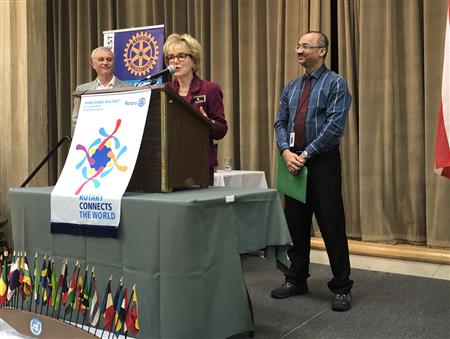Shari Cunningham received her 30-year pin, Romeo Girardi announced that he's moving to B.C. and guest speaker Dr. Wajid Ahmed, Medical Officer of Health for the Windsor-Essex County Health Unit, spoke on the importance of immunizations in preventing diseases.

The Monday meeting began by honouring Shari Cunningham with her 30-year pin – thank you for your continued Service Above Self, Shari! Shari was one of 3 women inducted into our Club in 1989, the year the Rotary International constitutional change was made to eliminate the “male only” provision for Rotary Clubs worldwide. Shari was President of our Club in the 2007-2008 Rotary year.
An important announcement was made during Happy Bucks: Romeo Girardi, who has been a member for 26 years and was president in 2008-2009, stated that he and his wife Gerty will be moving to British Columbia to be closer to their children and grandchildren in April. We wish them all the best, and are grateful for all the contributions made throughout his years of service.
We were also happy to welcome back member and honorary Club sing-songer Bill Willkinson, who had been ill.
Ashok Rajan introduced guest speaker Dr. Wajid Ahmed, Medical Officer of Health for the Windsor-Essex County Health Unit. Dr. Ahmed focused on the importance of immunizations in preventing diseases. He touched on the history of vaccines in Canada, including the eradication of smallpox in the 1970’s – the first disease to be eradicated from all countries. Given the importance of Polio eradication as a Rotary mandate, Dr. Ahmed stated that 1994 was the year Canada was declared polio-free, however we can’t forget that the world is now a “global village”, and with the travel of people comes risk of the spread of disease. He said the biggest threat of the resurgence of diseases today is vaccine hesitancy, which is “the reluctance to vaccinate despite the availability of vaccines”. Approximately 15-20% of Canadians are vaccine hesitant, and approximately 3% are vaccine refusers. Dr. Ahmed ended with the importance of vaccinations in older adults. Vaccination for children is often the focus, but older adults are also a vulnerable population that can benefit from immunizations. The routine and publicly funded vaccines for older adults include: influenza (which is recommended every year), pneumococcal vaccine (funded after 65 years), herpes zoster also referred to as shingles (funded at 65 to 70 years), and a tetanus and diphtheria booster vaccine (recommended every 10 years). Shari Cunningham thanked Dr. Ahmed.
